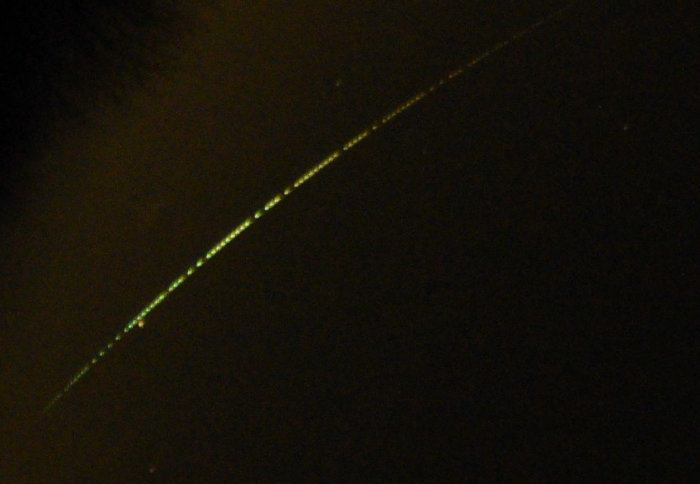Meteorite observation network sets out to catch a falling star

A meteorite spotted by the fireball network on February 16 2020, which landed in the North Sea
Imperial and Glasgow scientists are turning their eyes to the skies to track meteorites before they land on UK soil.
The team are also looking for volunteers to help them recover the space rocks whenever and wherever they fall.
We’re looking for volunteers to help us catch these falling stars. These meteorites could help us understand our own planet and solar system – and maybe even the wider universe. Sarah McMullan Department of Earth Science and Engineering
The UK Fireball Network, led by researchers from the University of Glasgow and Imperial College London, is setting out to place ten cameras across the country to catch glimpses of the spectacular natural firework displays caused when meteoroids enter Earth’s atmosphere.
On 16 February 2020, the network’s cameras in Lincoln and Cambridge both saw their first fireball, which dropped meteorites into the North Sea.
While those meteorites are impossible to recover, the network team expect that future sightings that fall on the UK landmass can be properly triangulated to determine a landing area and send out a search party to find the meteorites.
When the researchers catch sight of a fireball dropping meteorites on land, they’ll need the help of volunteers to help comb the countryside to find them.
Anyone interested in volunteering can sign up to the mailing list.
Co-lead researcher Sarah McMullan, of Imperial’s Department of Earth Science and Engineering, said: “We’re looking for volunteers to help us catch these falling stars. These meteorites could help us understand our own planet and solar system – and maybe even the wider universe.”
Co-lead researcher Dr Luke Daly of the University of Glasgow said: “Meteorites provide scientists with invaluable insights into other planets and our solar system. A good deal of what we know about the surface of Mars, for example, comes from analysis of chunks of the planet that were blasted off its surface by asteroid impacts millions of years ago and then drifted in space before falling to Earth.

“Meteorites enter our atmosphere all the time, but the UK hasn’t had a great track record of finding them in recent years – in fact, it’s been nearly 30 years since one was last seen dropping into a back garden in Glatton in Cambridgeshire, and more than 100 since one was observed in Scotland.”
“Camera networks like ours, and those of partner organisations, give us a great chance to capture fireballs on multiple cameras. Together we are building an integrated pipeline to use all the data from all the networks to track fireballs called the UK Fireball Alliance. Catching images on more than one camera allows us to estimate not just where they land, but calculate the trajectory of their arrival, which allows us to calculate where in space it came from. Pooling all our resources maximises the chances of capturing these elusive events.”
The network’s approach to meteorite observation has already been successful in Australia, where the Desert Fireball Network established by Curtin University has observed and recovered numerous meteorite falls in the outback.

The UK Fireball Network is part of a wider network called the Global Fireball Observatory operated by researchers at Curtin University.
Currently the UK Fireball Network has set up six of their ten cameras at sites in England, Scotland and Wales. Over the next couple of months, the remaining cameras will be placed in other locations, including Northern Ireland.
Initial funding for the UK Fireball Network was supplied by the Desert Fireball Network and the Australian Research Council, along with the University of Glasgow and Imperial College London.
This story was adapted from a press release by the University of Glasgow.
Images © UK Fireball Network
Article text (excluding photos or graphics) © Imperial College London.
Photos and graphics subject to third party copyright used with permission or © Imperial College London.
Reporter
Caroline Brogan
Communications Division